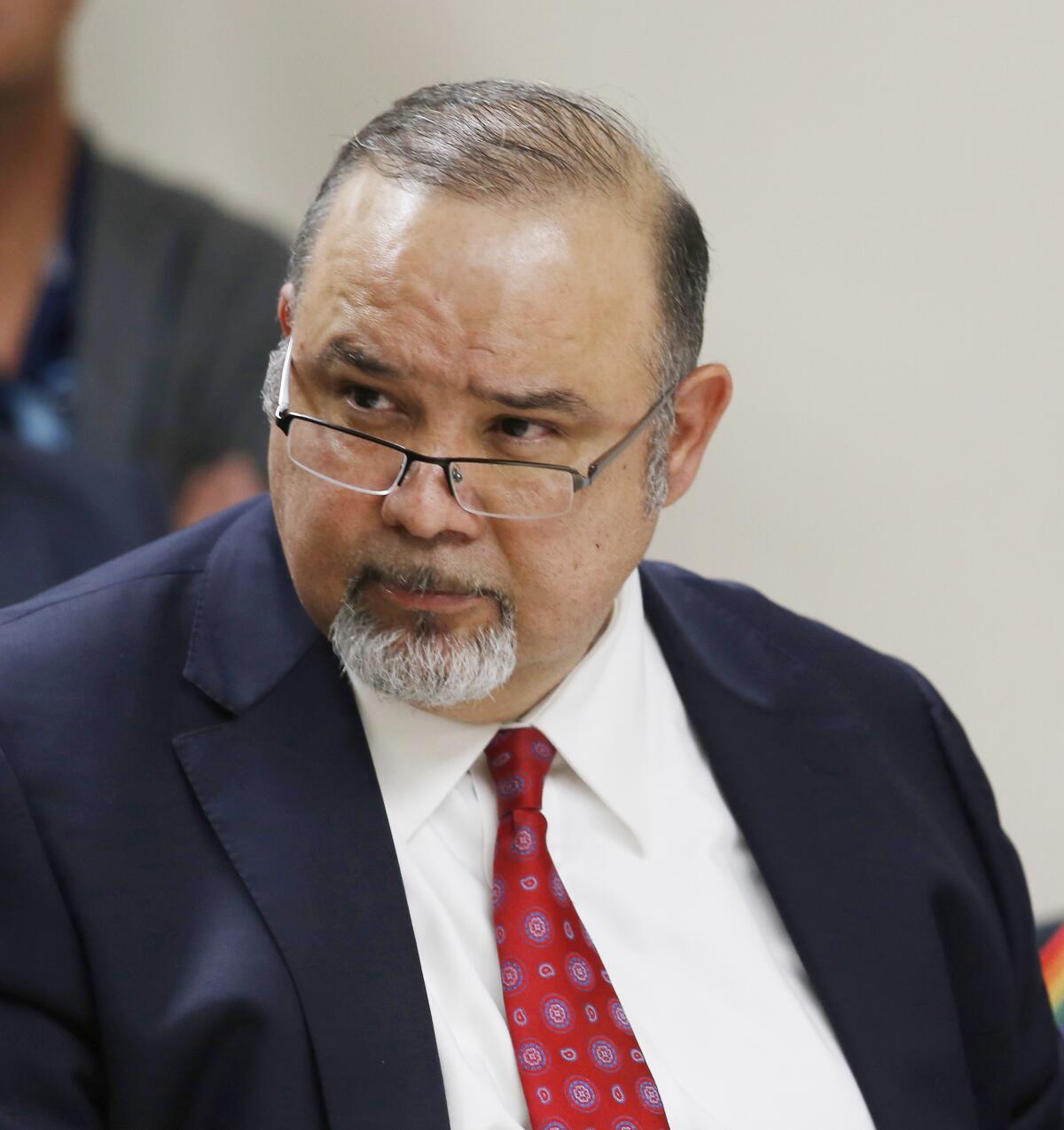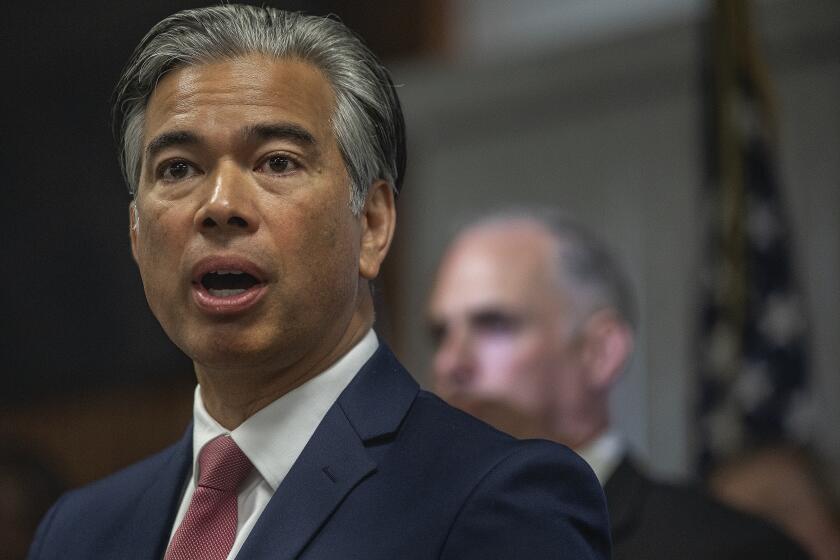California lawmaker questioned in sprawling cannabis corruption investigation

- Share via
- A recently unsealed plea agreement suggests that state Sen. Susan Rubio was part of a sprawling cannabis bribery scheme when she served on the Baldwin Park City Council in 2018. Rubio denies wrongdoing.
- Rubio said she talked to federal authorities and was told she is not a target of their investigation into a plot in which officials allegedly took bribes for permits to operate marijuana businesses.
Documents made public by the U.S. attorney’s office last week allege that a public official who fits the profile of state Sen. Susan Rubio was part of sprawling cannabis bribery scheme when she served on the Baldwin Park City Council and campaigned for state office in 2018.
Rubio, a Democrat, said through a spokesman that she “has no reason to believe that she would be included in any criminal allegations.”
The documents do not name Rubio, but they describe a public official who fits her profile: someone who was in a position to terminate the Baldwin Park city attorney in 2017 and 2018, and was running for state office through November of 2018. Rubio is the only Baldwin Park official whose experience matches those criteria.
The information was revealed in a plea agreement in which former Baldwin Park City Atty. Robert Tafoya admitted his role in a cannabis bribery scheme and agreed to cooperate in ongoing public corruption investigations. Edgar Cisneros, the former city manager of Commerce, also pleaded guilty in the plot in which local officials allegedly took bribes to hand out permits for marijuana businesses.
According to his unsealed plea agreement, Tafoya alleges that an unnamed Baldwin Park official requested $30,000 in cash payments to later be funneled into their state campaign account through straw donors. The candidate allegedly wanted these small donations to “demonstrate to other donors his/her broad support in the community,” the plea says.
In exchange for the money, Tafoya alleges the candidate agreed to use their powers as a state elected official to protect Tafoya’s job and assist him financially.
The plea agreement describes Tafoya meeting with the unnamed Baldwin Park official in 2017 and providing the first $15,000 payment “in cash in an envelope.” A second cash payment of the same amount came after the unnamed official “won his/her primary in June 2018,” the document says.
Campaign finance reports show two contributions totaling $2,600 from Tafoya & Garcia, LLP — a law firm belonging to Tafoya that is mentioned in the plea agreement — to Rubio’s campaign in August and October 2018.
Two more former Southern California officials have admitted to participating in a cannabis corruption ring.
Rubio’s office did not answer The Times’ question about whether she is the unnamed individual Tafoya refers to in his plea.
“Mr. Tafoya has apparently made allegations against numerous individuals in order to reduce his sentence,” Rubio spokesperson Matthew Z’berg said in a statement.
Z’berg said federal officials informed Rubio that she is not a target in the government’s investigation, and he added that she “volunteered hours of her time” aiding the authorities in their investigation. A spokesperson for the U.S. attorney’s office said he could neither confirm nor deny these claims.
Z’berg also pointed to Rubio’s record on the City Council voting against approval for a cannabis business.

In his plea agreement, Tafoya said he agreed to the transaction because he believed the official could remove him from his job as city attorney. He also said the person would “provide [him] additional work” if they were elected to state office.
The unnamed official, referred to only as “Person 20” in the plea agreement, was identified as someone in a position to expel the Baldwin Park city attorney from office. Council members are the only officials with the authority to remove the city attorney, according to the Baldwin Park city code.
The plea also says that the official Tafoya bribed was a candidate for state office “starting in 2017 and ending in November 2018,” the same time frame when Rubio successfully campaigned for her first term as senator.
Commercial cannabis resulted in corruption and questionable conduct that has rocked local governments across California, a Times investigation found.
The Times checked the rosters of the sitting members of the City Council who were also running for state office during that period. No other public official in Baldwin Park who had the power to remove Tafoya from office was also campaigning for state office during that period, according to Robb Korinke, who runs GrassrootsLab, a public affairs firm that maintains a database of candidates who run for local and state office across California.
The Times identified two other people who are similar to the description of “Person 20” in the plea agreement, but missing key details. One was Monica Garcia, who served on the Baldwin Park City Council at the same time and also ran for state office. But she was eliminated in the primary election, so she was not running in November 2018, which is how the plea agreement describes “Person 20.” The other person was Mike Eng, Rubio’s opponent in the 2018 general election. But he was not a public official in Baldwin Park and therefore did not have authority to remove Tafoya from office as described in the document.
Garcia and Eng did not respond to requests for comment.
The alleged racketeering operation began in June 2017 when then-Baldwin Park City Councilmember Ricardo Pacheco began soliciting bribes from marijuana companies for permits to operate in the San Gabriel Valley community. Those scandals prompted a 2023 statewide audit aimed at curtailing bribery in the cannabis business.
The revelations mirror a Times investigation on corruption in marijuana licensing. Citing The Times’ story, a California lawmaker wants a statewide task force to investigate.
In November 2023, Cisneros quietly resigned from his office in the city of Commerce in southeast L.A. County and pleaded guilty to federal bribery charges. Tafoya resigned as Baldwin Park city attorney in 2022 and pleaded guilty to federal bribery and tax evasion charges in December 2023.
“A lot of people felt bringing cannabis into our community was going to benefit them monetarily,” said Cruz Baca, a former Baldwin Park city councilwoman. “They saw an opportunity to charge whatever they want to and jumped on the bandwagon because [cannabis] companies wanted to come into the community.
“It was like a gold rush,” she added. “There were certain people who were attracted to that.”
After the legalization of weed in California, corruption bled through local governments from the Inland Empire to the San Gabriel Valley and southeast Los Angeles County, a Times investigation found.
When California legalized cannabis, many cities enforced strict limits on the number of cannabis licenses they would issue. Most cities still prohibit cannabis businesses from operating. With such a limited number of permits available, competition for them is high.
Baldwin Park bans delivery and laboratory testing of cannabis but allows sale at retail stores, and local manufacturing, cultivation and distribution of the plant. City officials began awarding licenses in late 2017 and have said the maximum number of permits they’ll allow is 25. The city is one of 27 in Los Angeles County that allow at least one type of cannabis business, while an additional 61 cities prohibit it completely.
More to Read
Sign up for Essential California
The most important California stories and recommendations in your inbox every morning.
You may occasionally receive promotional content from the Los Angeles Times.














